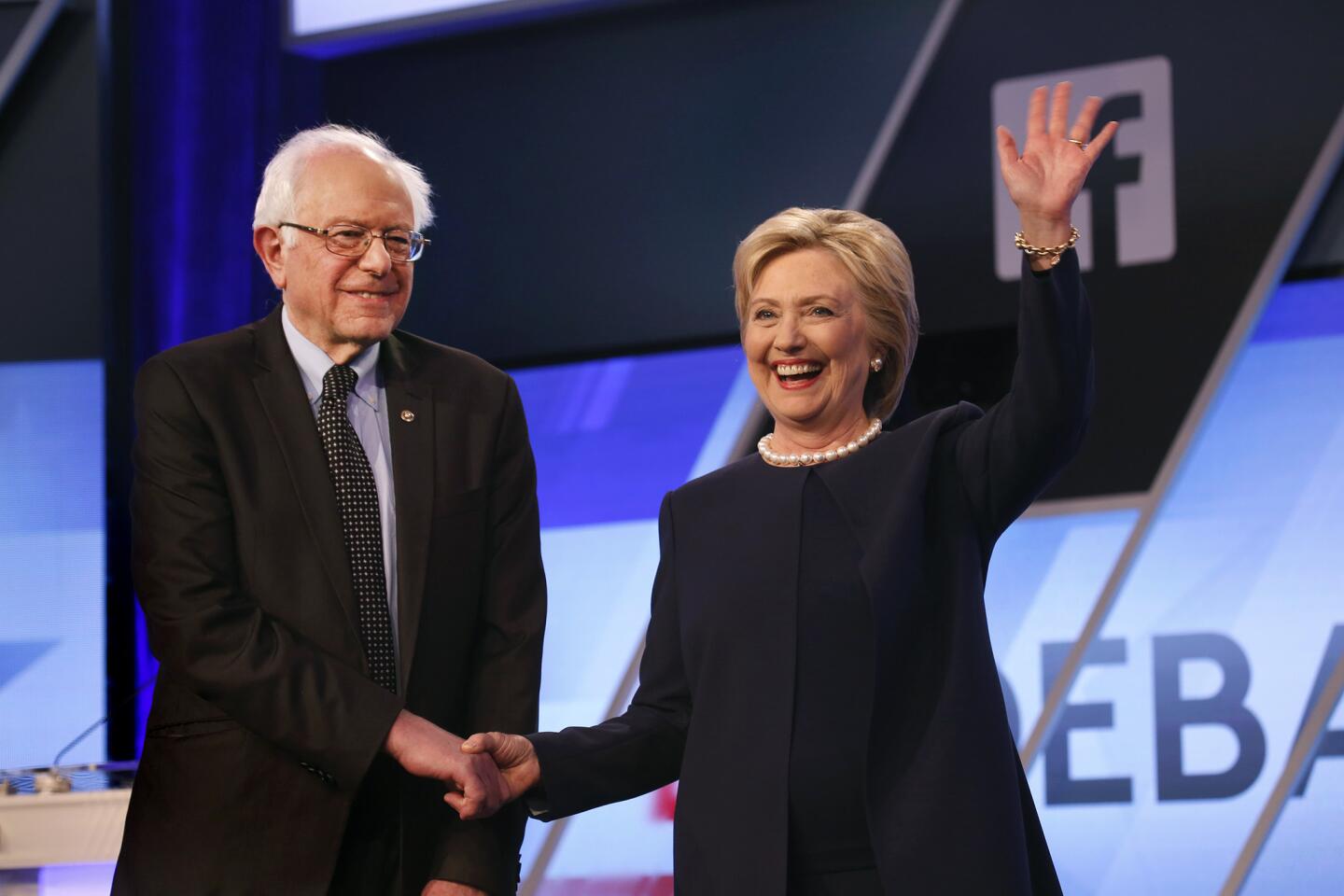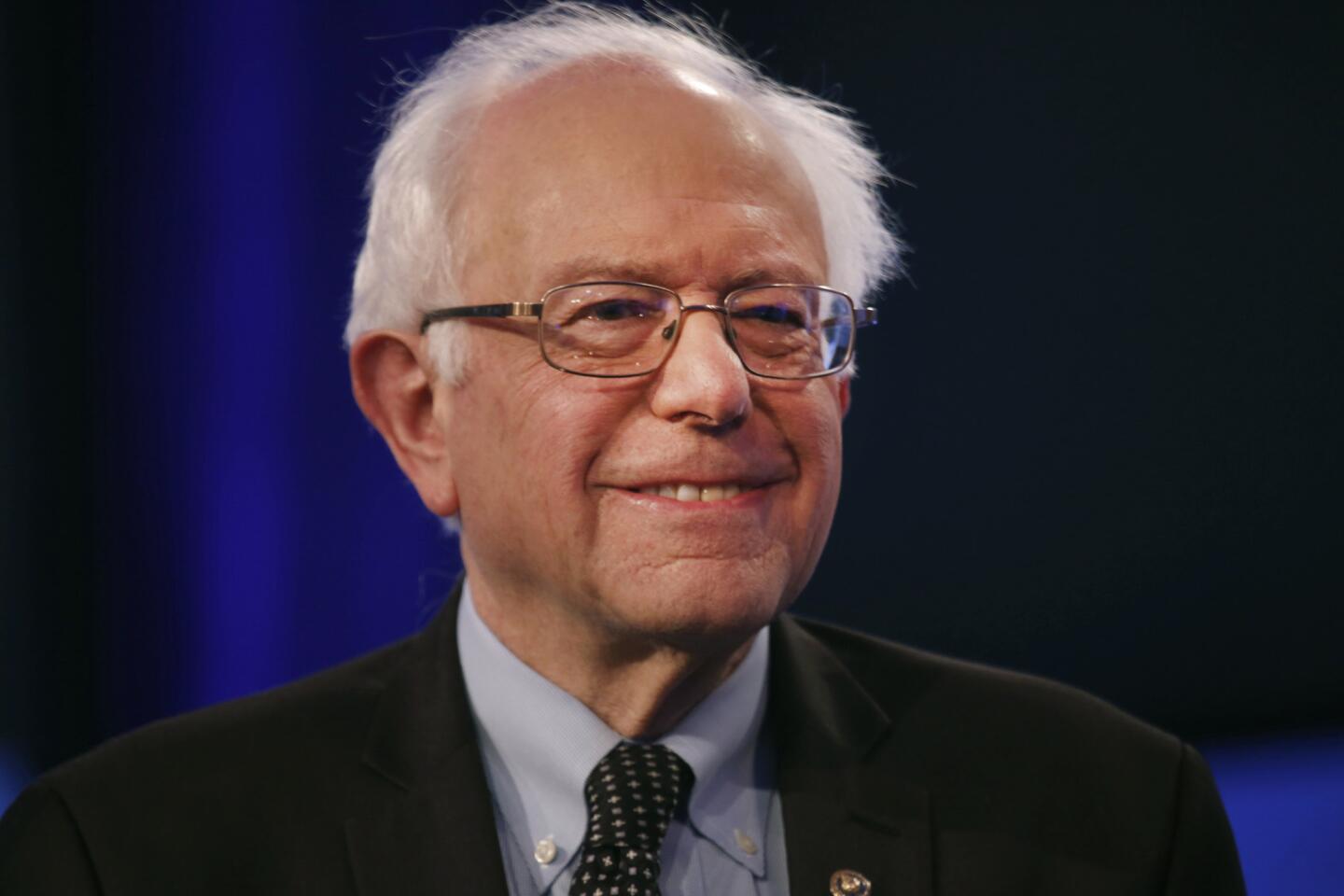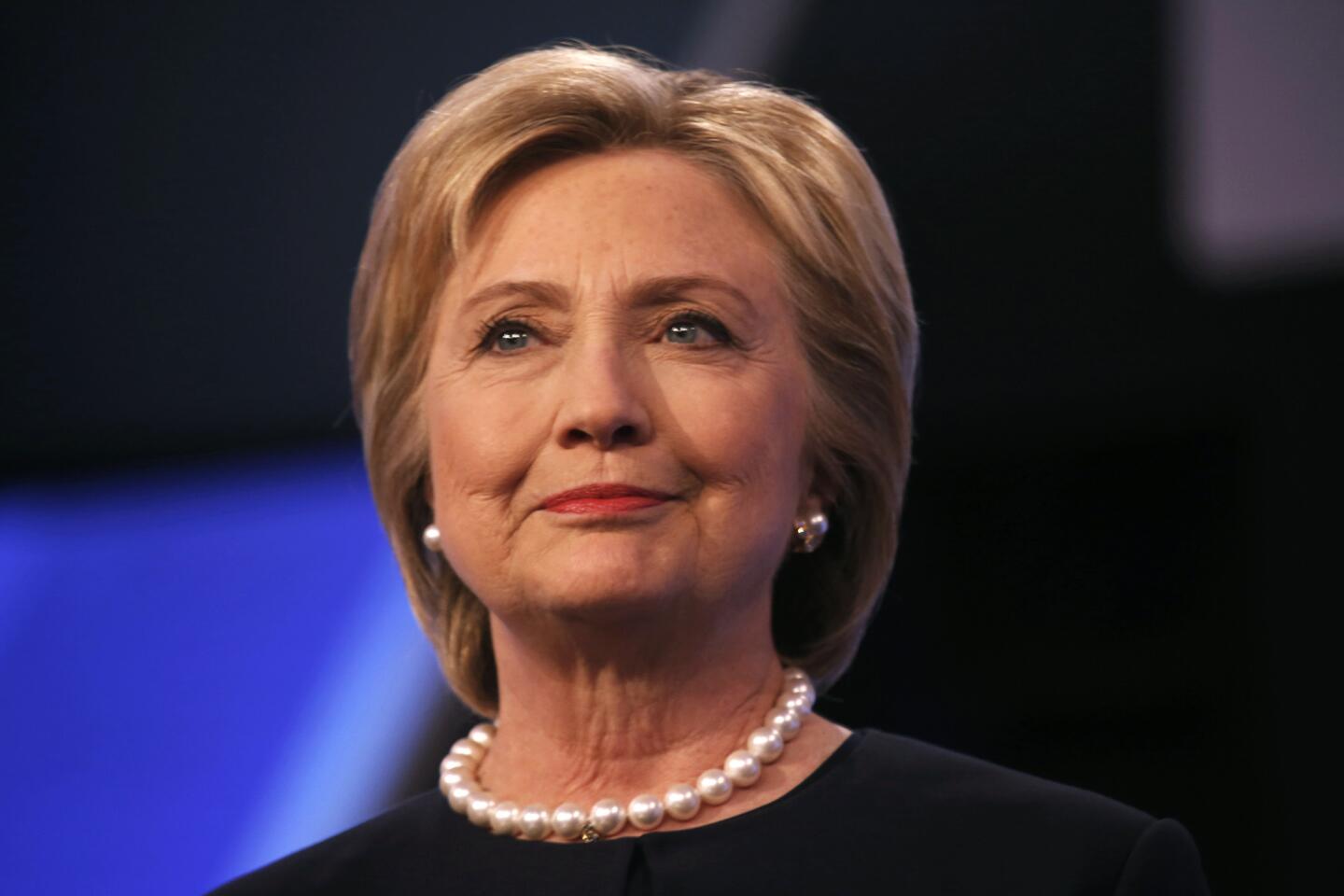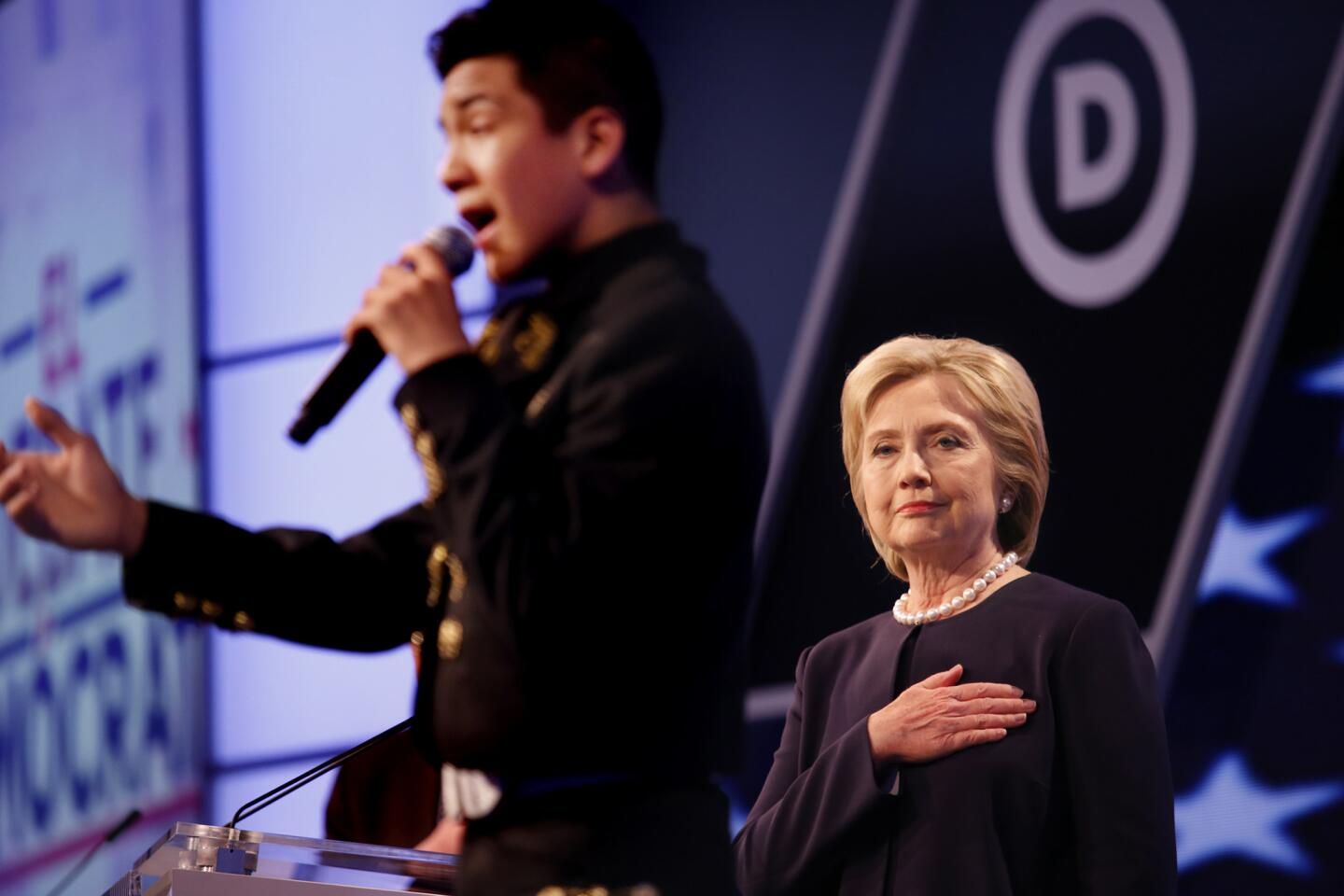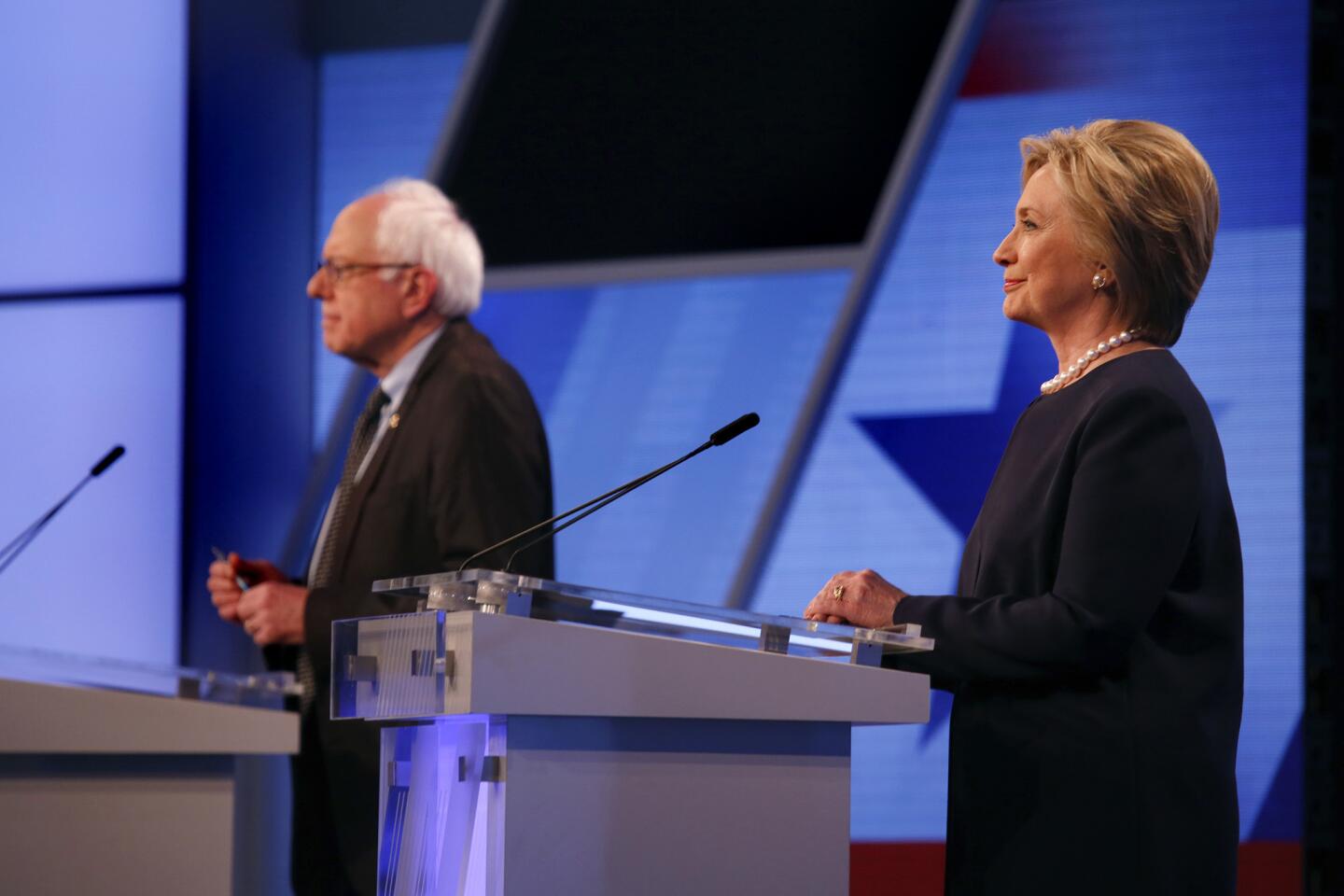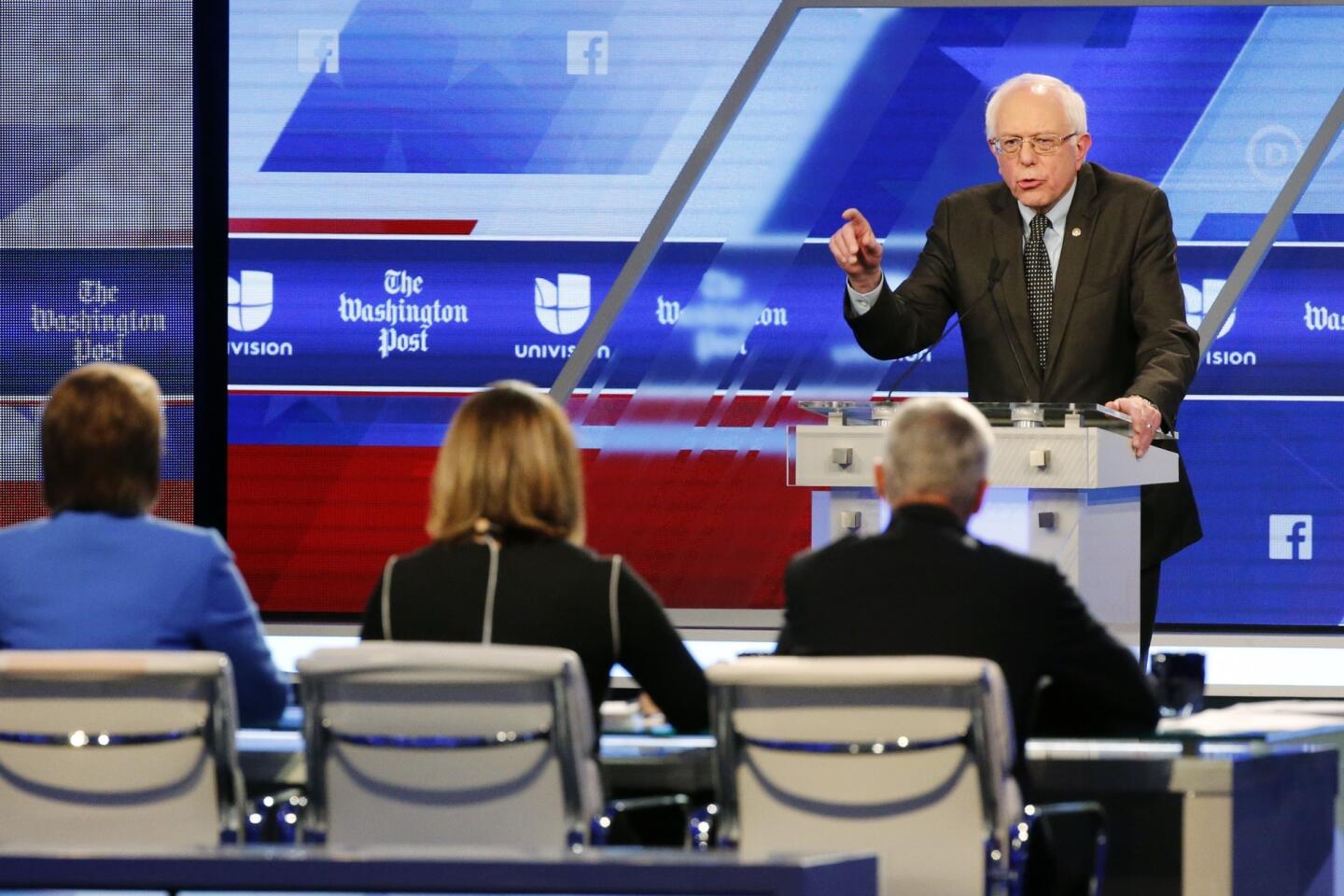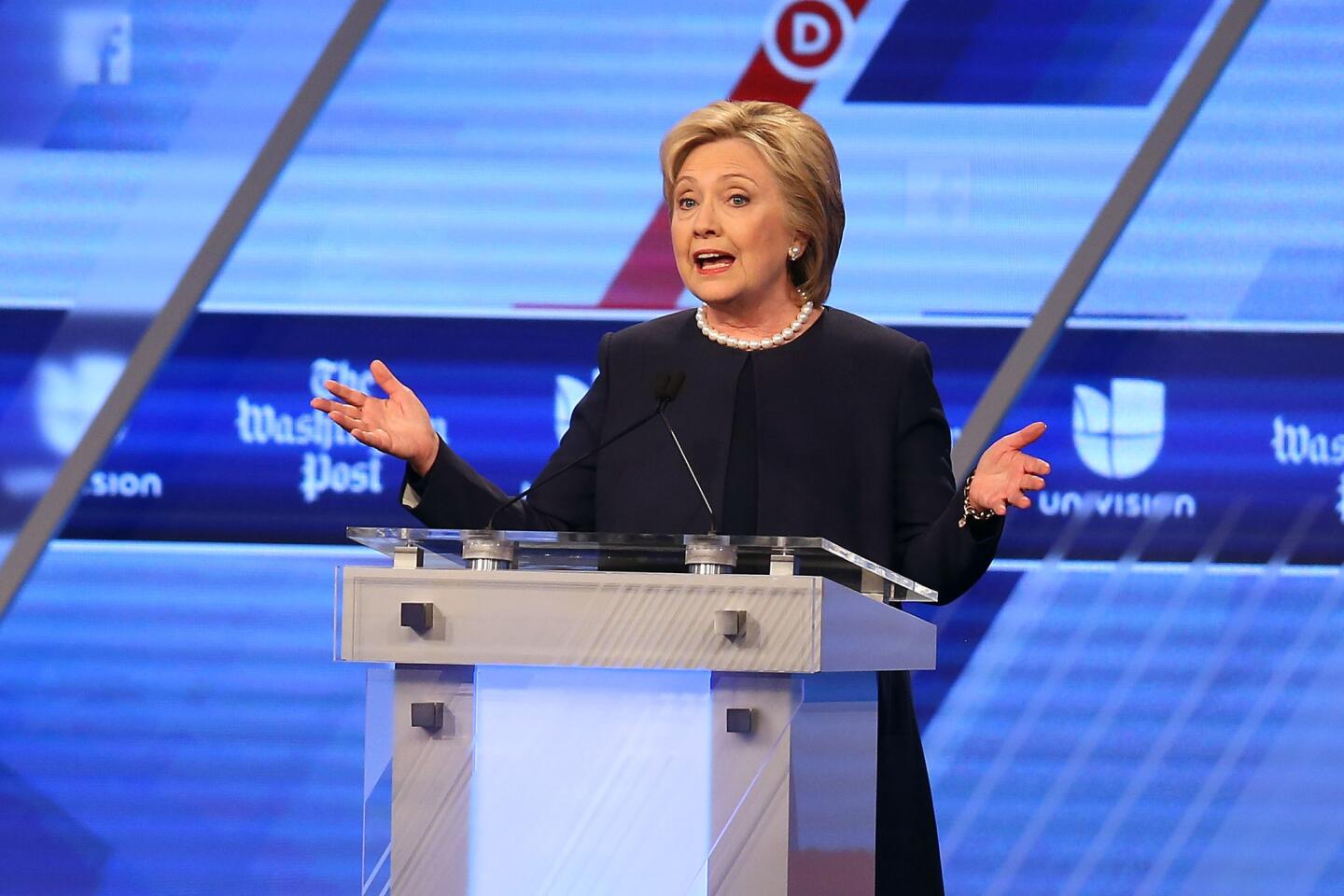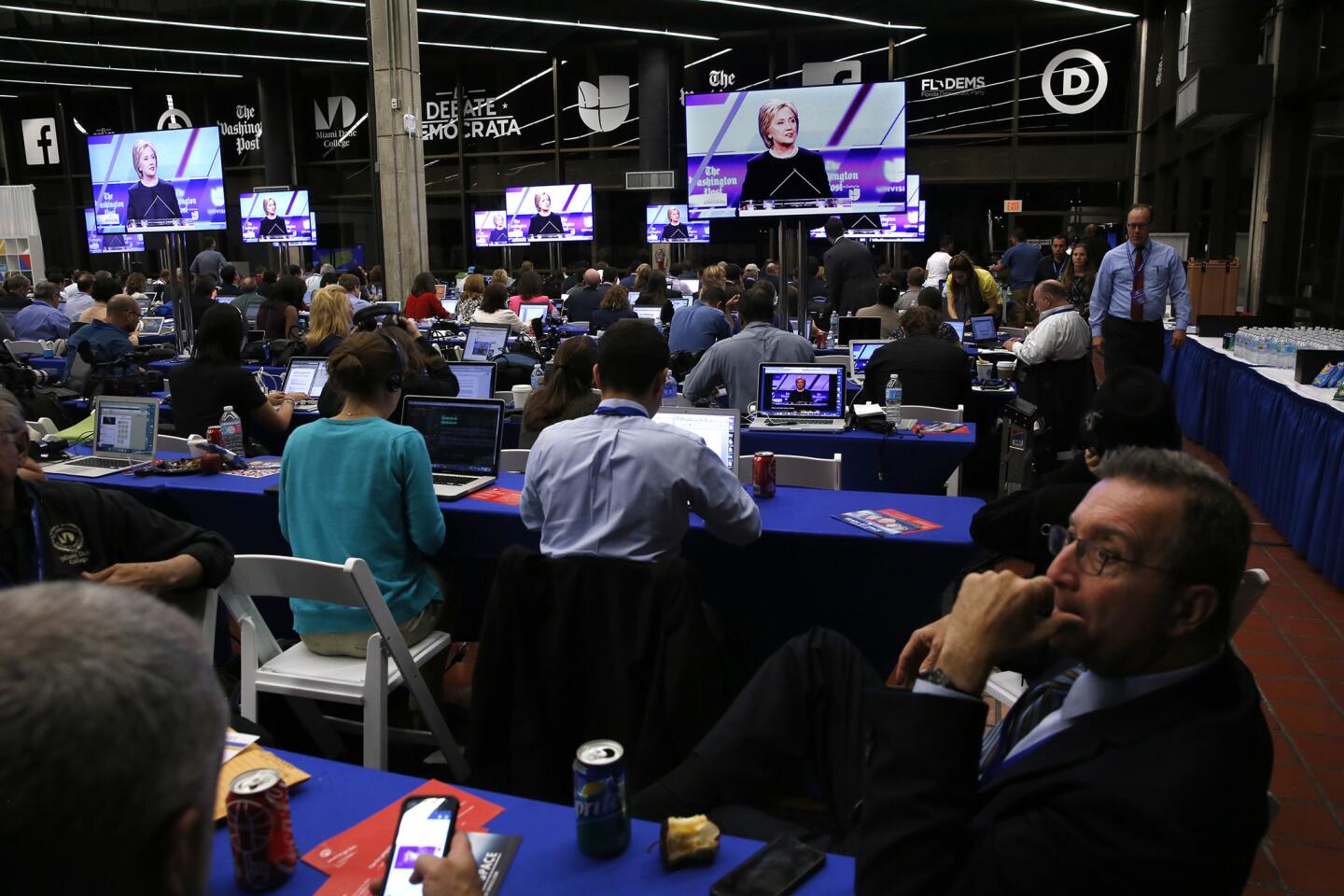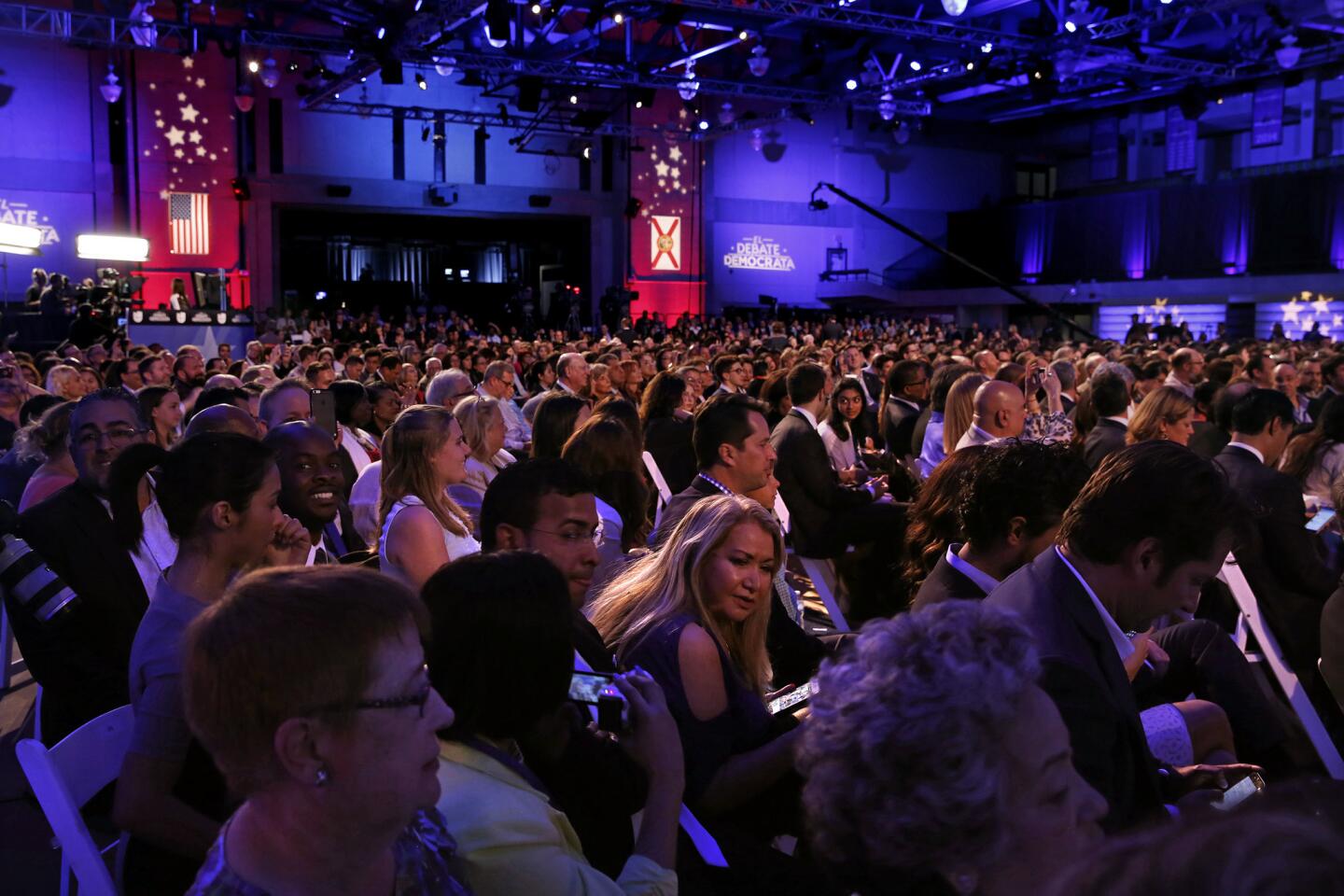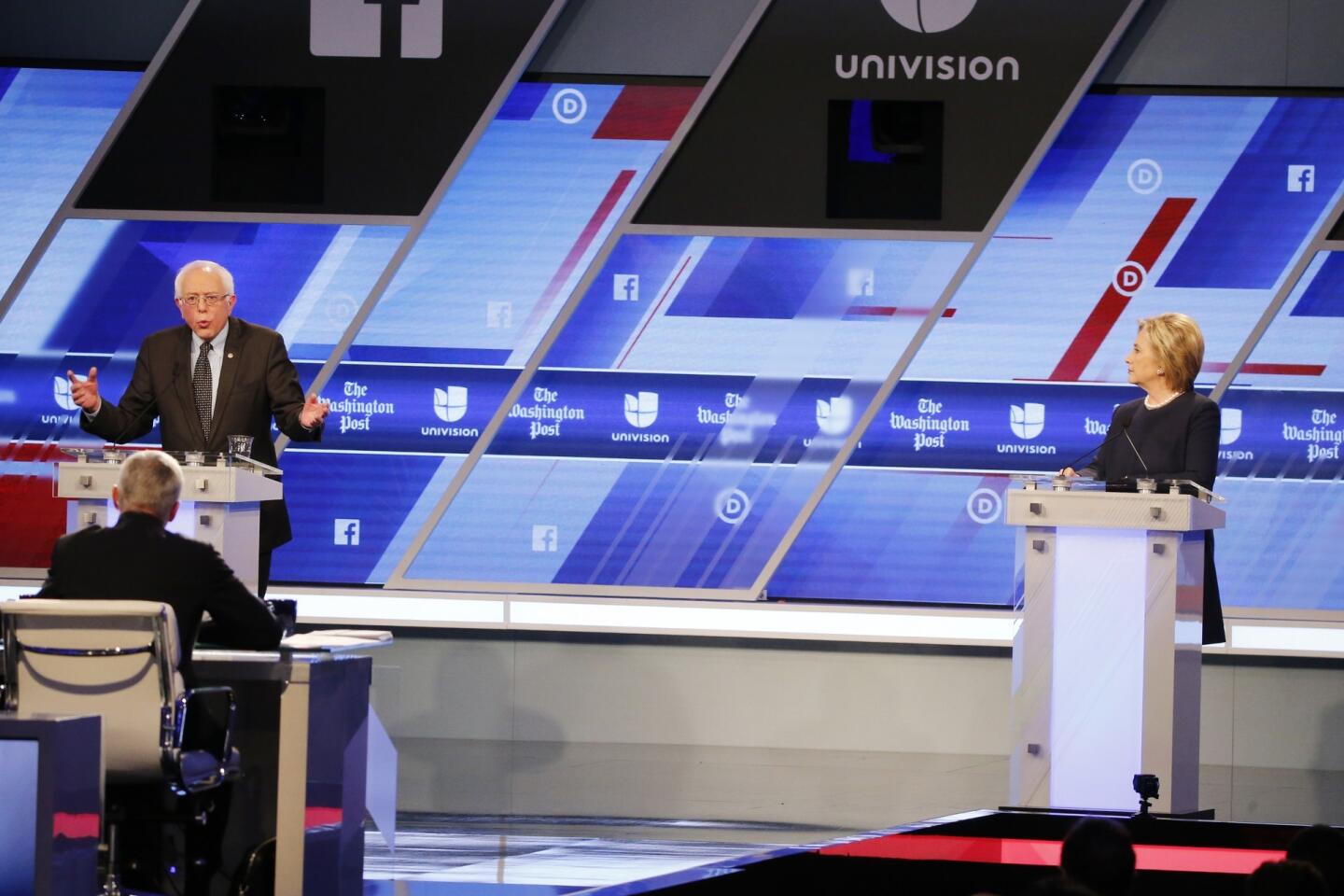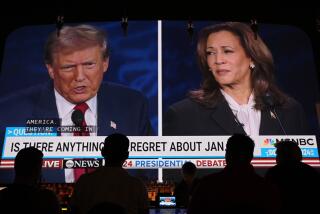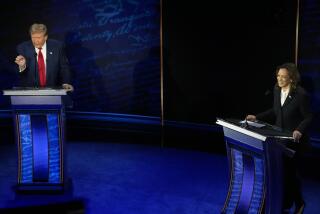Tough debate questions, especially for Clinton, after her surprise loss to Sanders in Michigan
Reporting from Miami — Hillary Clinton’s embattled status as the Democratic presidential front-runner, dented Tuesday by a surprise defeat in Michigan, faced new challenges Wednesday during a debate with Bernie Sanders that often delved into the vulnerabilities that have complicated her path to the nomination.
Clinton had to grapple not only with an emboldened rival who challenged her views on trade and alleged chumminess with Wall Street, but also with moderators who probed her views on deportation policies, her response to the attacks in Benghazi, Libya, in 2012, and the continuing investigation into her email practices as secretary of State.
At one point Clinton was even asked whether she would consider dropping out of the race if the Justice Department investigation of her emails led to an indictment — a blunt inquiry that appeared to take her aback.
“Oh, for goodness — that’s not going to happen,” she responded tersely to Univision’s Jorge Ramos. “I’m not even answering that question.”
Election 2016 | Live coverage on Trail Guide | Track the delegate race | Sign up for the newsletter
Sanders, too, came in for tough questioning, particularly about a videotaped interview from 1985 in which he pointed out Fidel Castro’s work to improve Cuban society, including education and healthcare.
The senator from Vermont appeared surprised by the tape. Clinton sharply criticized him for praising the “values” of the Cuban revolution.
“If the values are that you oppress people, you disappear people, you imprison people or even kill people for expressing their opinions, for expressing freedom of speech — that is not the kind of revolution of values that I ever want to see anywhere,” she said.
Sanders said his remarks in the interview involved speaking out against U.S. attempts to overthrow democratically elected governments in Latin America.
“Cuba is, of course, an authoritarian, undemocratic country, and I hope very much as soon as possible it becomes a democratic country,” he said. “But on the other hand, it would be wrong not to state that in Cuba they have made some good advances in healthcare.”
The exchange was a reminder that while Sanders fares well in polls against potential general election opponents, he has not gone through the sort of intense vetting Clinton has faced, and his background could include more that opponents could use against him if he were the Democratic nominee.
More immediately, the debate revealed the extent to which Sanders’ narrow victory in Michigan had altered the dynamics of the race just as Clinton hoped to begin rallying Democrats behind her candidacy for the general election.
Clinton did not shy from aggressive attacks on the senator, challenging the feasibility of promises such as free tuition in state colleges and Medicaid expansion.
“My dad used to say, ‘If it sounds too good to be true, it probably is,’” she said.
And she attempted to turn Sanders’ critique of recent economic policies and the political system into a liability by questioning his loyalty to the party.
“Sen. Sanders is always criticizing the two recent Democratic presidents.... I wish he would criticize, and join me in criticizing, George W. Bush, who I think wrecked the economy and created the conditions for the Great Recession,” she said.
Sanders responded that he had stood up to Bush and worked closely with both Democrats.
Both candidates were challenged over how their approach to immigration would differ from President Obama’s. They pledged not to deport children and stated their support for a pathway to citizenship for people who are in the country illegally.
But they picked apart each other’s records on the issue with an eye toward making inroads with Latinos.
Clinton criticized Sanders for voting against immigration legislation nearly a decade ago and accused him of siding with the Minutemen, a notorious vigilante group that was “setting up outposts along the border to hunt for immigrants.”
Sanders rejected the attack, saying Clinton was misconstruing his positions by plucking individual provisions out of large, complicated pieces of legislation.
“I do not support vigilantes,” he said. “And that is a horrific statement — an unfair statement.”
The conversation was a reminder of the gulf between Democrats and Republicans, whose presidential candidates have emphasized increasing border security or deporting people who are in the country illegally.
“We have a secure border,” Clinton said. “There’s no need for this rhetoric and demagoguery.”
Some of the intense focus on issues popular with Latinos has been driven by Donald Trump, the Republican front-runner who has described Mexican immigrants as criminals and pledged to build a wall along the border.
Asked whether they consider Trump to be racist, Clinton called the GOP front-runner’s rhetoric “un-American.”
“You don’t make America great by getting rid of everything that made America great,” she said.
Sanders noted that Trump had been a leading “birther” who questioned whether Obama was born in the U.S. and eligible to serve as president. “Nobody has ever asked me for my birth certificate,” Sanders said. “Maybe it has something to do with the color of my skin.”
Asked once again to address the investigation into her email practices as secretary of State, Clinton insisted she had done nothing improper and that the decision by the government to retroactively classify some of her emails was incorrect.
“What we’ve got here is a case of over-classification,” she said, noting that her predecessors also used personal email accounts and had emails classified retroactively.
“I am not worried about it, and no American should be either,” she said.
Pressed on what went wrong for her in Michigan, Clinton emphasized that she had continued to increase her lead in the number of delegates won.
“This is a marathon,” she said. “And it’s a marathon that can only be carried out by the kind of inclusive campaign that I’m running — a campaign that reaches out to everybody.”
Sanders, bolstered by strong fundraising from small-dollar donors, said he expected to continue notching victories in the coming weeks and months. He also has his eye on so-called superdelegates, the elected officials and party leaders who can choose which candidate to support. Most support Clinton, but Sanders said he would convince them “that Bernie Sanders is the strongest candidate to beat Donald Trump.”
Clinton faced the most scrutiny in Wednesday’s debate. In addition to questions about her email server, she was asked whether she had lied about the 2012 attack on a U.S. diplomatic compound in Benghazi.
“I feel a great deal of sympathy for the families of the four brave Americans that we lost in Benghazi,” she said, but she added that the mother of one of the victims was “absolutely wrong” when she accused her of lying to them about who was responsible.
“Everything was changing literally by the hour. And when we had information we made it public,” she said. “But then sometimes we had to go back and say we had new information that contradicts it.”
Clinton also was asked about the misgivings many voters have about her despite her decades in public life.
“I am not a natural politician — in case you haven’t noticed — like my husband or President Obama,” she said. “I just have to do the best that I can, get the results I can, make a difference in people’s lives, and hope that people see that I’m fighting for them.”
Megerian reported from Sacramento and Memoli from Washington. Times staff writer Melanie Mason contributed to this report from Miami.
For more on Campaign 2016, follow @ChrisMegerian
MORE ON CAMPAIGN 2016
‘What do you want in your next president?
With Florida just days away, Rubio is all in, but some donors say he should quit now
Ohio’s GOP primary may be a last chance — to save Kasich, and blunt Trump
More to Read
Get the L.A. Times Politics newsletter
Deeply reported insights into legislation, politics and policy from Sacramento, Washington and beyond. In your inbox three times per week.
You may occasionally receive promotional content from the Los Angeles Times.
